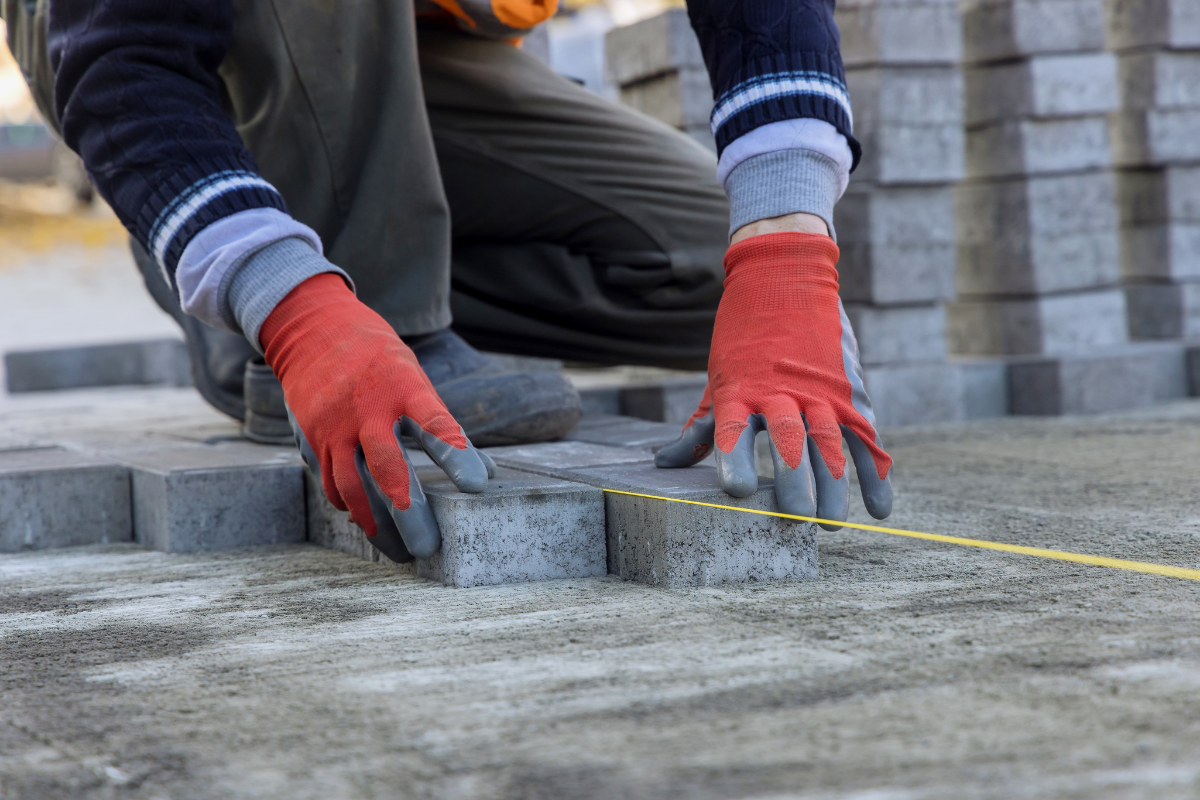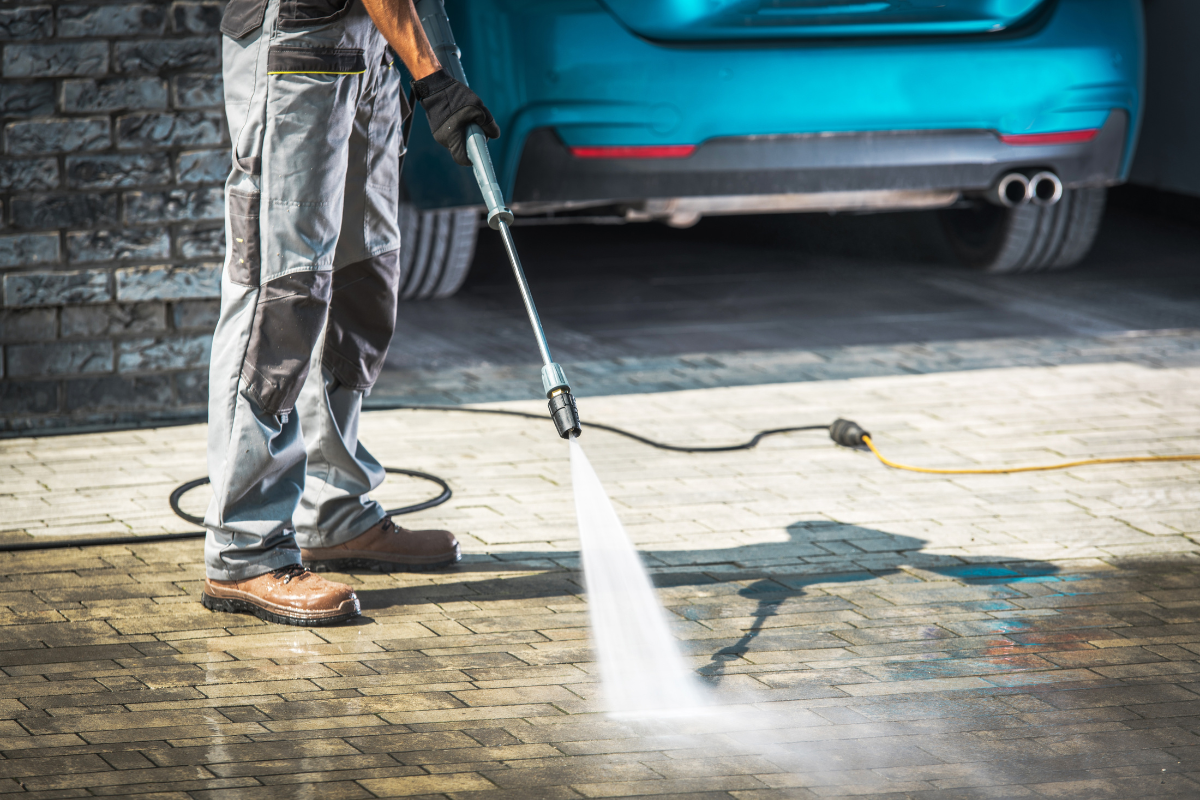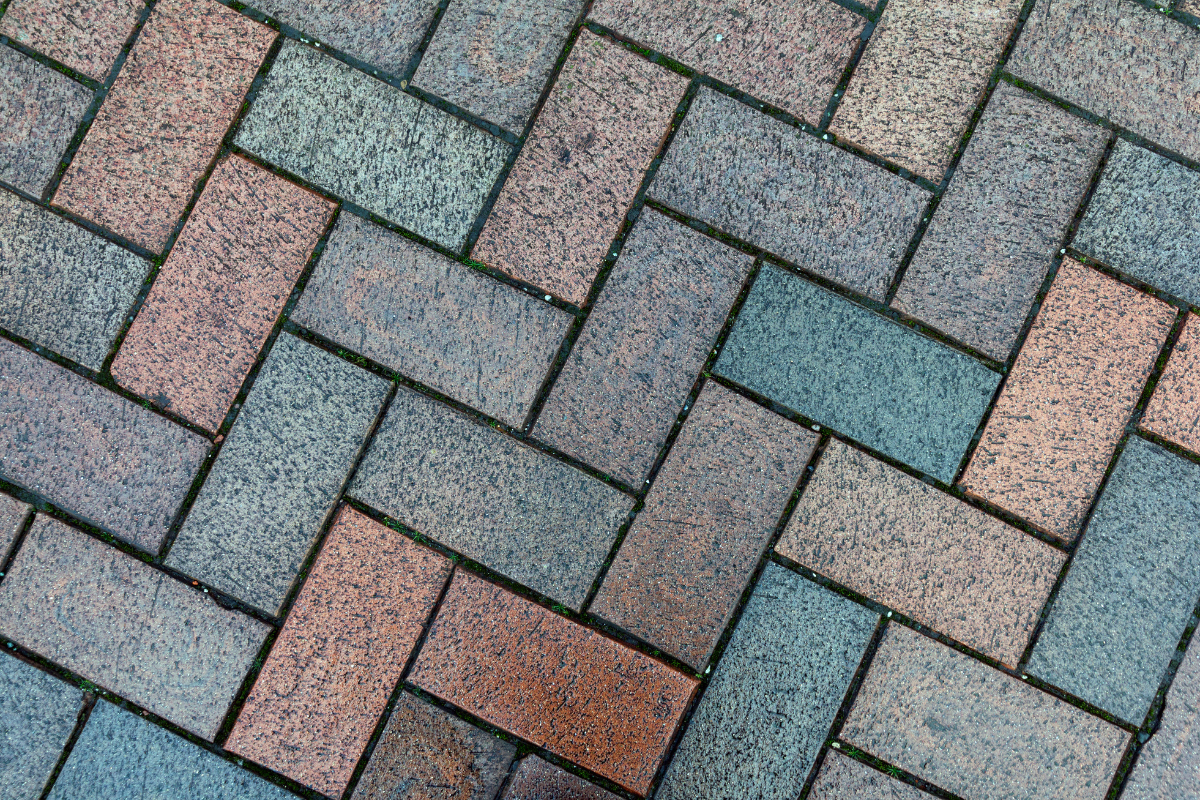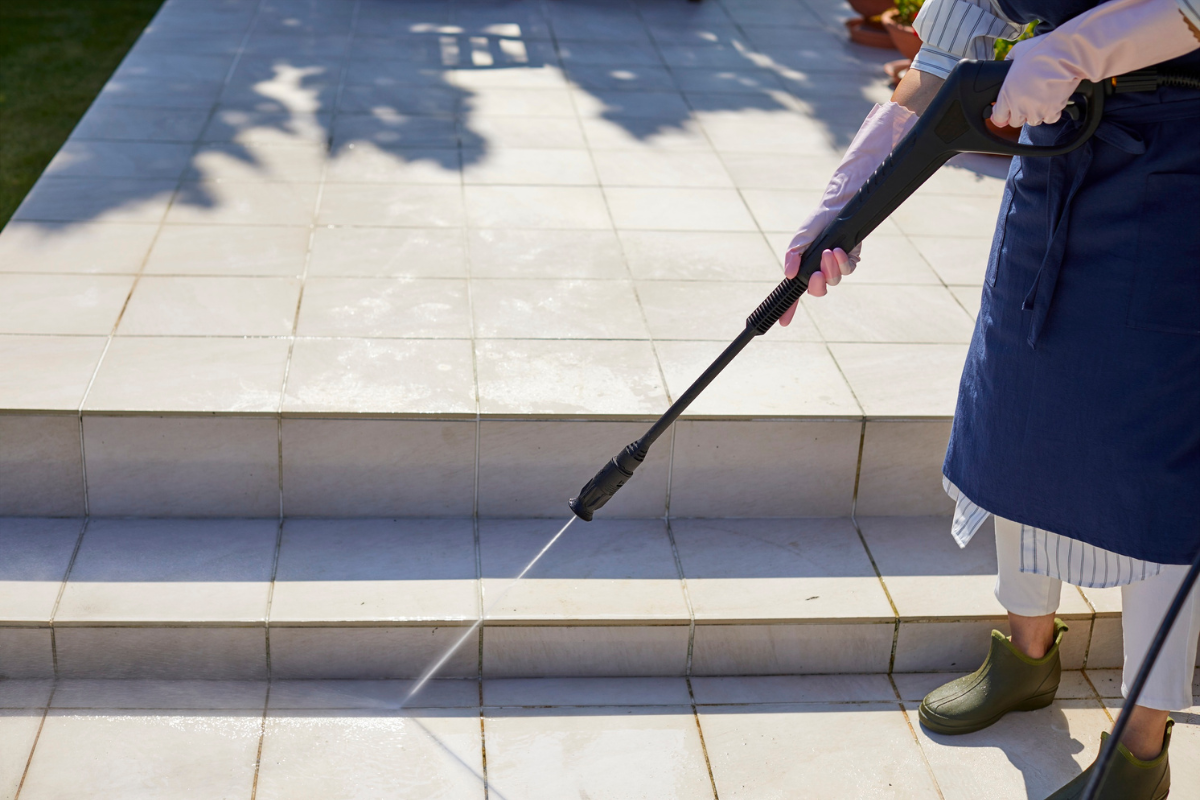
Driveway Pressure Washing Near Me: Boost Your Home’s Value Fast



Curb appeal sets expectations before anyone steps through the door. Real estate agents know this, appraisers know this, and buyers react to it instinctively. A clean, bright driveway signals a home that has been looked after. It frames the landscaping, ties the facade together, and often decides whether a passerby slows down to look twice. That is why professional driveway pressure washing delivers an outsized return for such a quick upgrade. In a single afternoon, years of grime and tire shadows can disappear, and the rest of your property benefits by contrast.
I have walked homeowners through hundreds of cleanings, from asphalt ribbons under oak canopies to interlocking pavers around modern builds. The same pattern shows up across budgets and neighborhoods: the driveway is the biggest horizontal surface people see from the street, and it leads the visual story. When it looks fresh, everything else feels newer.
What a clean driveway really signals
Most people notice the obvious improvements first. Oil stains fade, algae disappears, and the surface brightens by a couple shades. That alone can bump perceived value because buyers subconsciously assign maintenance credit to a clean home. It also removes safety hazards. Algae and mildew create slick patches, especially on shaded concrete and sealed pavers. Once that biomass is gone, traction improves and the surface dries faster after rain.
The less obvious benefit is how cleaning resets the surface for smarter upkeep. On concrete, a proper wash exposes hairline cracks and joint failure you could not see under dirt. On pavers, it clears joints of organic material so you can replenish sand and evaluate whether paver sealing makes sense this season. If you plan to list your home, two small jobs done in the right order - pressure washing followed by selective touch-ups - can pay back more reliably than a single big-ticket project you cannot finish before showings.
When a simple wash is enough and when it is not
Not every driveway has the same finish or problem set, and a good pressure washing service starts with the right diagnosis. Concrete can handle more pressure than pavers, but not all concrete is equal. Newer mixes and broom-finished slabs tolerate higher PSI. Older, brittle surfaces near their aggregate will scar if you get aggressive. Pavers are durable, yet their vulnerabilities sit at the joints and along the edges where sand and joint stabilization matter.
There are jobs where a straightforward wash gets you 90 percent of the gain. Light tire marks, surface dust, pollen, and general dulling lift quickly with the correct tip and steady wand control. Then there are the edge cases:
- Oil and transmission fluid seep deep and may require a degreaser pretreatment and hot water to fully lift. Cold water and high pressure alone often smear hydrocarbons and leave ghosting.
- Rust stains from sprinkler overspray or metal furniture can bite into concrete chemistry. A targeted rust remover helps, but it needs skilled handling and precise dwell time.
- Black algae on pavers and concrete often indicates a moisture trap. Without a fungicidal wash and better drainage, the stain returns in a few months.
A professional will test-clean a small section first. If the stain lifts cleanly, you proceed. If not, the plan shifts - perhaps a detergent soak, a surface cleaner attachment to maintain even pressure, or a pivot to soft washing on delicate surfaces.
The right way to handle pavers
Homeowners love the warmth of pavers around the driveway apron and walkway, but they are less forgiving of poor technique. The mistakes I see most come from overpressure and incorrect tips. A tight, needle-like jet strips joint sand and leaves wand marks on the face of the brick or stone. You can avoid that with a wider fan tip and a surface cleaner head that spreads force evenly. Even then, you need to maintain consistent travel speed.
After the cleaning, the joints must be addressed. If your wash removes organic material and a portion of joint sand, you need to sweep in clean polymeric sand once the surface dries. That sand stabilizes the system and reduces weed germination. If you skip this step, pavers shift under vehicle weight and joints become a seedbed again.
The final decision is whether to seal. Paver sealing does not just add gloss. A good paver sealer locks joint sand, resists UV fading, and slows water penetration. In Florida markets like Lutz, where humidity and storms dominate the calendar, you see the difference in color retention and how much easier the next cleaning goes. If you have been searching for paver sealing near me after a fresh wash, make sure the contractor works with the right chemistry for your paver type and climate. Water-based sealers have improved markedly, cure faster, and emit less odor. Solvent-based formulas still win for deep enhancement on some stones. Either way, never trap moisture. The surface must be truly dry before sealing, which may take 24 to 48 hours depending on shade and wind.
How pressure washing affects property value
Value shows up in two ways: faster interest and stronger offers. Clean drives and walkways pull buyers into listing photos, which means more showings. Local agents I work with estimate that curb-focused tune-ups - driveway pressure washing near me, basic landscape grooming, front door paint, and window cleaning - can move the needle by a few thousand dollars on mid-range homes, and by much more on high-end properties where finishes are scrutinized. It is not the wash alone; rather, it allows the rest of your preparation to read as intentional and complete.
There is also the appraisal angle. Appraisers note condition and functional obsolescence. A driveway pitted with algae, tire etching, and weeds creeping through joints suggests deferred maintenance. The same slab cleaned and, where appropriate, sealed reads as sound. When you are playing for small margins near a price threshold, those optics help hold the number.
Local habits make or break results
Climate and water chemistry drive staining and regrowth. In coastal and humid regions, black algae, mold, and mildew thrive. Shaded drives under hardwoods collect tannin stains and pollen. Areas with iron-heavy well water deal with rust streaks from sprinklers. Each calls for a slightly different washing and sealing approach. In Lutz and nearby communities, we schedule washes around leaf drop and pollen surges. We pretreat algae before pressure so we are not chasing black streaks with brute force. For paver cleaning Lutz homeowners often ask for a double pass: a soft wash for walls and coping, then a surface-cleaned pass on the drive, followed by joint work and a clear paver sealer that can handle high UV.
Hard water spots on dark pavers can etch if left long enough. This shows up on modern charcoal pavers that have been splashed repeatedly. You can limit this with quick rinses after irrigation and by dialing in irrigation heads so they do not hit hardscapes. A light acid wash has its place, but use it sparingly and neutralize thoroughly. I see more damage from indiscriminate acid than from algae.
What a careful contractor does differently
Great results come from process, not just equipment size. The best pressure washing service in your area will own more than a big pump. They will carry a range of tips, surface cleaners, safe detergents, and a sense of restraint. They will tape and bag outlets, protect nearby concrete paver maintenance plants, and control runoff. They will ask about your irrigation schedule, pool deck, and whether you plan to seal or paint afterward.
A good test is how they speak about pressure itself. If they lead with a PSI number and little else, keep asking questions. Flow rate, tip selection, surface temperature, and detergent choice matter more than a single pressure spec. The safest path to a great result usually comes from modest pressure applied evenly after the right pretreatment. The goal is to lift contamination, not erode the substrate.
Washing and sealing, in the right sequence
Timing matters. If you plan to seal concrete or pavers, do not rush. After pressure washing, let the substrate dry. Concrete holds moisture longer than you think, especially in cool or shaded conditions. Sealing over trapped water turns milk-white and can delaminate. For pavers, wait until the joints are refilled and vibrated with a plate compactor, then blow off dust before sealing. The first rain after sealing should bead, not cloud.
There are cases where sealing is not the right move. Very old, friable concrete with exposed aggregate may be better left unsealed and simply cleaned annually. On pavers with structural issues, sealing is a bandage at best. Address base failures first. If joints constantly wash out, you likely have drainage or slope problems that no paver sealer can solve.
Equipment and chemistry that actually work
Homeowners often ask whether to rent or call a pro. If you have a simple, flat concrete slab in good condition, a rented machine with a surface cleaner head can handle basic dirt and light tire tracks. Add a mild concrete-safe detergent and a stiff broom for agitation on spots. The risk comes from impatience and poor technique. Holding a wand too close, using a zero-degree tip, or lingering on edges creates zebra striping and etches the cream layer of the concrete. Those scars catch dirt faster and are hard to blend out.
Pros rely on hot water rigs for grease, rotary surface cleaners to maintain even spacing of jets, and staged detergent systems. For algae and mildew, they will lean on soft wash mixes that sanitize without blasting. For rust, a targeted product formulated for concrete cuts reaction time and lowers the chance of burns or discoloration. Each chemical has a dwell time and a neutralization step. Slowing down to respect those windows prevents collateral damage to landscaping, metals, and nearby finishes.
Safety and environmental stewardship
Rinsing contaminants into storm drains is not just frowned upon. In many municipalities, it is not allowed. A reputable pressure washing service controls wastewater, diverts it to permeable areas when permitted, or uses containment where needed. They also shield plants, rinse them before and after chemical contact, and avoid overspray on cars and windows. Gloves, eye protection, and awareness of slick surfaces sound basic, yet I have seen injury and liability claims from simple missteps like walking backward on wet pavers.
For homeowners who want to take on part of the job, one simple habit reduces risk: work in sections. Pre-wet landscaping, apply cleaner to a manageable area, agitate if needed, then rinse thoroughly. Avoid washing in full sun with dark surfaces. Heat accelerates chemical reaction and can set streaks. Early morning or late afternoon gives you more control.
How often to clean and seal
Frequency depends on shade, irrigation, and traffic. Sunlit, well-drained driveways with good airflow can stay sharp for 10 to 14 months after a professional wash. Shaded drives under trees may need a touch-up every 6 patio paver maintenance to 9 months to keep algae at bay. After paver sealing, you should get 2 to 3 years of protection before a maintenance coat, assuming a quality product and proper prep. Traffic lanes wear faster, so a spot recoat in year two sometimes stretches the life of the whole surface.
If you are listing your home, schedule driveway pressure washing near me two to three weeks before photography. That window gives you time to address any revealed cracks or joint issues, dial in landscaping, and avoid fresh water spots in listing photos. If sealing is part of the plan, schedule at least a Pool deck paver sealing week earlier to ensure full cure.
Cost, value, and realistic expectations
Pricing varies by region and scale, but you can gut-check quotes with a simple framework. For driveway pressure washing, expect square-foot pricing that slides down as area grows. A typical two-car driveway might fall in the low hundreds for driveway cleaning cost a basic clean, rising with pretreatments, stain removal, and complexity like tight access or heavy algae. Add paver cleaning, joint work, and paver sealing, and you move into a broader range driven by sealer quality and labor intensity. Ask what is included: pretreatment, post-rinse, plant protections, and whether a return visit is built in if stains ghost back after the surface fully dries.
As for results, a skilled crew can erase years of weathering in a day, but not every stain disappears entirely. Tire polymer transfer, deep oil wicking, and iron etching leave faint marks that may never go to zero without resurfacing. A frank conversation up front builds trust. I would rather set a 90 percent improvement expectation and deliver 95 than promise the moon and leave you staring at one stubborn shadow in the wheel path.
Choosing a service without regret
It is tempting to pick the lowest quote for a seemingly simple job. The difference in outcome, though, lives in technique, patience, and accountability. Check that the team you hire is insured, understands surface types, and can explain their process in plain language. Ask about their approach to pavers, whether they include polymeric sand when needed, and which paver sealer they prefer and why. Locals brick paver sealing in Lutz who run searches for paver cleaning Lutz or paver sealing near me will find plenty of options, but not all crews treat joint stabilization and curing times with the same respect. Hire the one who does.
Here is a compact checklist you can use when screening providers:
- Describe your surface material and age, and listen for tailored advice rather than a one-size answer.
- Ask how they handle pretreatment, runoff, and plant protection, and confirm they avoid zero-degree tips on finished surfaces.
- For pavers, confirm joint sand replacement and what type they use, polymeric or traditional.
- If sealing, ask about chemistry, expected lifespan, and cures times, and whether they perform moisture tests before application.
- Request a written scope with pricing for add-ons like degreasing, rust removal, or return visits.
Where DIY works and where it backfires
An owner with a modest concrete slab, a free weekend, and a rented surface cleaner can produce satisfying results. Use a fan tip, keep the wand or surface cleaner moving, and work in overlapping passes. Pretreat oil with a safe degreaser. Rinse thoroughly away from doors and garages to avoid blowback.
The trouble usually starts when the surface changes. Decorative concrete with colored sealers can cloud or whiten if hit with harsh chemicals. Pavers with failing joints can lose sand and begin to rock under tires. Natural stone reacts unpredictably to acids and strong cleaners. If your driveway includes any of these, treat DIY like touch-up work, not a full restoration. For mixed surfaces, a seasoned pressure washing service earns its fee by choosing different techniques for each zone, washing and sealing only where appropriate, and protecting transition areas.
The telltales of a job well done
When you evaluate finished work, look for even color without zebra striping, intact edges, and clean joints. On pavers, the sand line should sit just below the chamfer, not flush with the surface where it will wash away. If sealed, the finish should look uniform without blotches. Water should bead. Drive onto sealed pavers only after the contractor gives the green light, typically 24 to 48 hours, and avoid tight turns while the film hardens fully.
Several weeks later, walk the drive after a rain. Algae-prone areas should dry at roughly the same pace as the rest. If you see early green haze in shaded corners, schedule a quick touch-up before it blooms. Staying ahead of regrowth keeps cleaning gentle and inexpensive.
Final thoughts from the field
Driveway pressure washing near me is one of those searches that can either lead to a forgettable chore or a small transformation with outsized impact. When done thoughtfully, it is more than blasting away dirt. It restores safety, reveals maintenance needs, prepares surfaces for paver sealing or concrete sealing, and elevates how your home is perceived. On paver-heavy properties, washing and sealing done in sequence preserves the system and cuts future upkeep. On plain concrete, a careful wash can erase years in an afternoon and set you up for simple annual care.
The best results come from matching method to material, respecting chemistry and cure times, and investing in details no one notices until they are wrong. If you are preparing to list, or if you simply want your place to look as good as it feels, start at the curb. Clean the driveway, address the joints, and, where it makes sense, apply the right paver sealer. Everything else you do for the home will look better because of it.
Bulletproof Pavers
Address: 1523 Green Meadow Dr, Lutz, FL 33549
Phone: (813) 401-0693